Mental health in emergencies
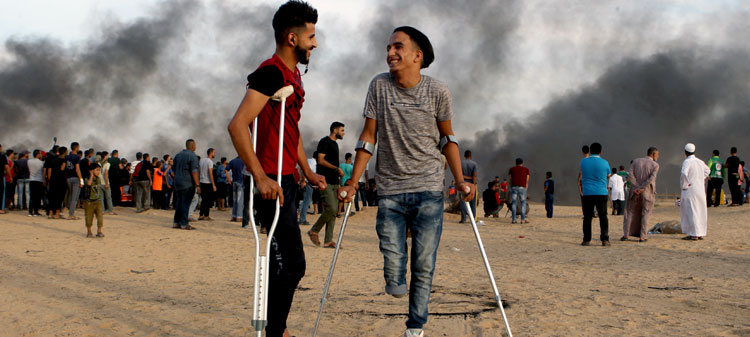
WHO’s Eastern Mediterranean Region is host to some of the world’s biggest emergencies and protracted crises. Ongoing political conflict in a number of countries in the Region has resulted in increased population movement due to forced displacement and migration. At the end of 2018, of the 70.8 million people forcibly displaced worldwide – including refugees and internally displaced persons – 32.1 million (45.3%) originated from the Region, while 25.4 million continued to reside in the Region. Countries neighbouring those in conflict are also severely affected by the large numbers of displaced people seeking refuge there.
In this Region and beyond, conflict is severely impacting the health of displaced populations and their host communities and increasing the need for mental health services. However, the limited availability of mental health specialists, shortages in psychotropic medicines and overall disruption to health systems in emergencies are creating barriers to people accessing services where they are most needed.
Mental health and psychosocial support in emergencies
Mental disorders and social and psychological distress in emergencies
People in emergencies may experience various types of psychological problems. These range from pre-existing problems to emergency-induced problems (e.g. grief and non-pathological distress) and problems related to humanitarian aid (e.g. anxiety due to a lack of information about food distribution). Almost all people affected by emergencies will experience psychological distress, such as feelings of anxiety and sadness, hopelessness, difficulty sleeping, fatigue, irritability or anger and aches and pains. It is important to note that this is normal and will improve over time for most people.
However, common and severe mental disorders also become more prevalent in humanitarian crises, especially among the most vulnerable (e.g. women and children) and those exposed to violence and forcible displacement. WHO estimates show that more than 1 in 5 people in post-conflict settings have depression, anxiety disorder, post-traumatic stress disorder, bipolar disorder, or schizophrenia. These estimates point to a large burden of mental disorders in conflict-affected populations – a burden even higher than previously estimated. This further emphasizes the urgent need for increasing access to mental health services and developing mental health interventions that can be delivered on a large scale.
Emergencies also lead to a range of social problems, which interact with and influence psychological problems. Poverty and the discrimination of marginalized groups are examples of social problems that are often further complicated by emergency-induced problems (e.g. family separation and loss of livelihoods) and other social problems related to humanitarian response itself (e.g. overcrowding and lack of privacy in camps).
Mental health conditions in conflict situations are much more widespread than we thought
Mental health and psychosocial support in emergencies
The term mental health and psychosocial support describes any type of support that aims to protect or promote psychosocial well-being and/or prevent or treat a mental disorder. WHO co-chairs the Inter-Agency Standing Committee Reference Group on Mental Health and Psychosocial Support in Emergency Settings that provides advice and support to organizations working in emergencies. WHO has also collaborated with partners in developing a range of practical guides to help establish and scale up mental health and psychosocial support in emergency settings.
MHPSS.net: the mental health and psychosocial support network
IASC Guidelines for mental health and psychosocial support in emergency settings
Mental health and psychosocial support in humanitarian emergencies. Eastern Mediterranean Health Journal, Volume 21, Issue 7
This paper outlines specific actions for mental health and psychosocial support by the health sector in the preparedness, response and recovery phases of emergencies. Broad recommendations for ministries of health are to:
embed mental health and psychosocial support in national health and emergency preparedness plans;
put in place national guidelines, standards and supporting tools for the provision of mental health and psychosocial support during emergencies;
strengthen the capacity of health professionals to identify and manage priority mental disorders during emergencies; and
utilize opportunities generated by the emergency response to contribute to development of sustainable mental health-care services.
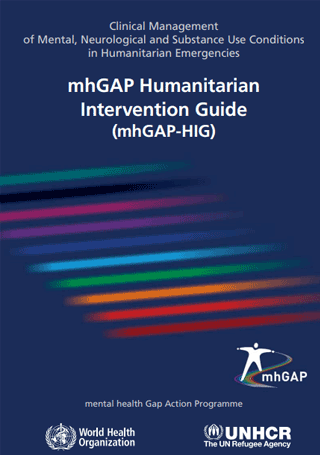
mhGAP humanitarian intervention guide (2015)
The mhGAP humanitarian intervention guide has been adapted for use by non-specialist health care providers in humanitarian emergencies where access to specialists and treatment options is limited. The mhGAP humanitarian intervention guide is a simple, practical tool that aims to support general health facilities in areas affected by humanitarian emergencies in assessing and managing acute stress, grief, depression, post-traumatic stress disorder, psychosis, epilepsy, intellectual disability, harmful substance use and risk of suicide.
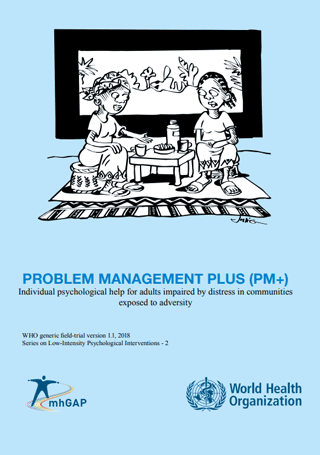
Problem management plus (PM+) manual (2016)
Problem Management plus (PM+) is a scalable psychological intervention aimed at adults impaired by distress in communities exposed to adversity. PM+ is suitable for settings with low numbers of specialists, and has been developed as a ‘transdiagnostic’ intervention that can help people with depression, anxiety and stress. It can be applied to improve aspects of mental health and psychosocial well-being no matter how severe people’s problems are.
Feature: scaling up capacity for Problem Management Plus (PM+)
As an annex to the mhGAP intervention guide, WHO and UNHCR have also developed a special module on conditions specifically related to stress for the assessment and management of acute stress, post-traumatic stress and grief in non-specialized health settings.
mhGAP module assessment management of conditions specifically related to stress
Psychological first aid
Psychological first aid describes a humane, supportive response to a fellow human being who is suffering and who may need support. Psychological first aid involves:
providing practical care and support which does not intrude;
assessing needs and concerns;
helping people to address basic needs (e.g. food, water, information);
listening to people but not pressuring them to talk;
comforting people and helping them to feel calm;
helping people connect to information, services and social supports; and protecting people from further harm.
Psychological First Aid offers first-line emotional and practical support to people experiencing acute distress due to a recent event and should be made available by field workers, including health staff, teachers or trained volunteers.
Psychological first aid: facilitator’s manual for orienting field workers (2014) [1.73 Mb]
Psychological first aid: guide for field workers (2011) [pdf 1.42Mb] |Farsi
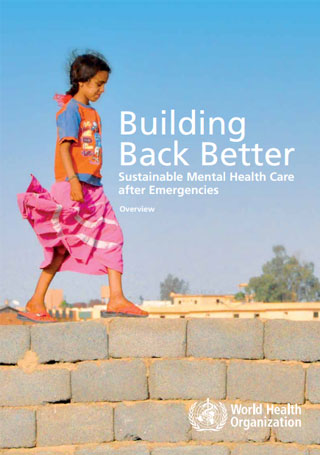
Building back better
In spite of their tragic nature and adverse effects on mental health, emergencies are also unparalleled opportunities to improve the lives of large numbers of people through mental health reform. This is important because mental health is crucial to the overall well-being, functioning, and resilience of individuals, societies, and countries recovering from natural disasters, armed conflicts, or other hazards.
Building back better raises awareness about this type of opportunity, and describes how this was achieved in 10 diverse emergency-affected areas, including Afghanistan, Iraq, Jordan, Somalia, West Bank and Gaza Strip. Lessons learnt and key overlapping practices emerging from these experiences are summarized. By publishing this report, WHO aims to ensure that people faced with emergencies do not miss the opportunity for mental health reform and development.
Building back better: sustainable mental health care after emergencies
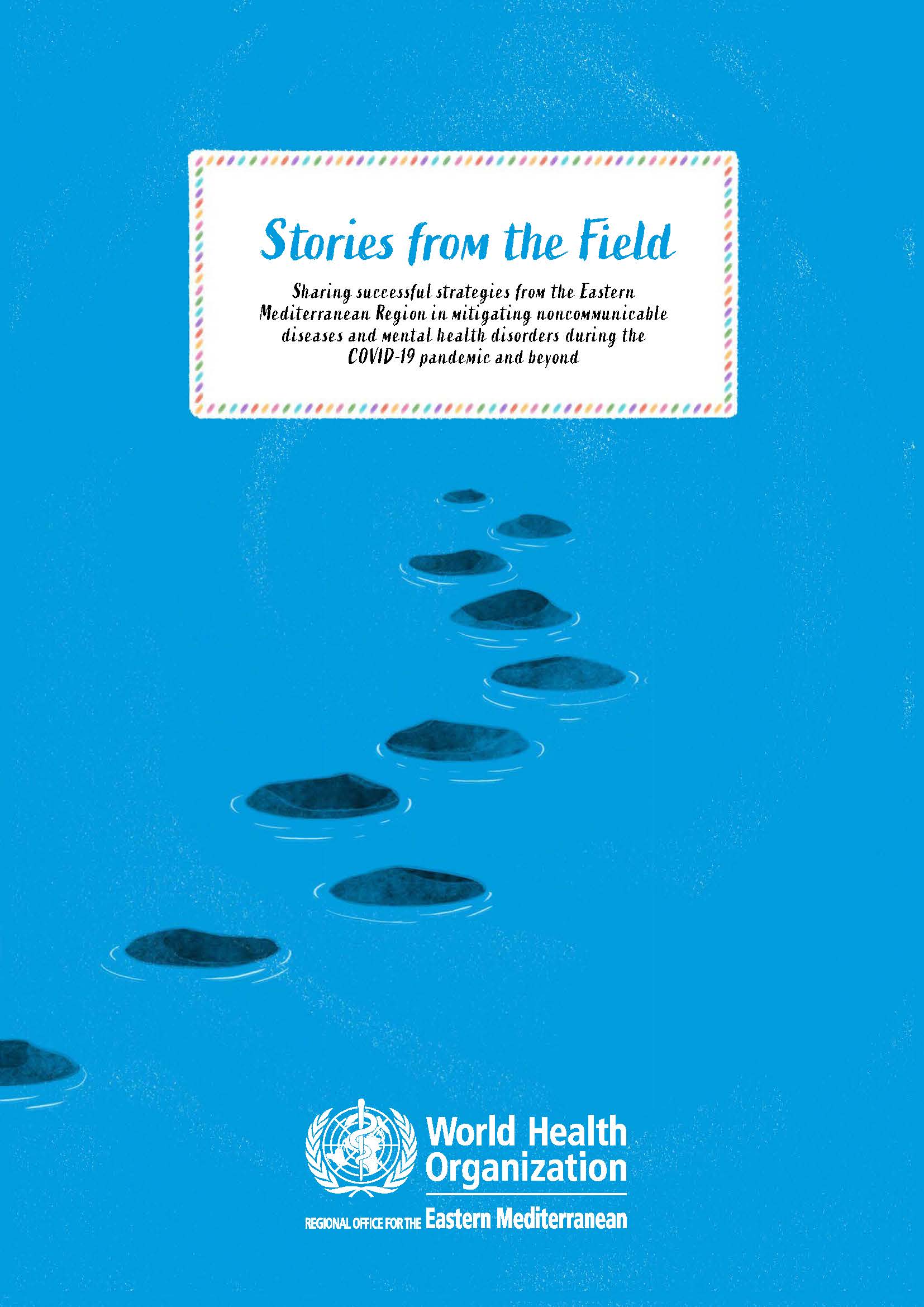
Stories from the field: sharing successful strategies from the Eastern Mediterranean Region in mitigating noncommunicable diseases and mental health disorders during the COVID-19 pandemic and beyond
The Eastern Mediterranean Region is diverse and includes some of the world’s highest and lowest income countries. The work they have undertaken to address NCDs and mental health disorders in the face of not only COVID-19, but other crises, including conflict and population displacement, can therefore offer insights to a wide range of countries around the world. By sharing these stories from the field, WHO and countries of the Region aim to promote successful strategies to mitigate NCDs and mental health disorders now and in the future.
Countries across the Region focused on the mental health of their citizens. New and innovative ways of accessing mental health support, despite pandemic restrictions, helped people receive the treatment they needed. Countries also turned the anxiety caused by the pandemic and its social and economic effects into an opportunity to break down taboos and promote the discussion of mental health issues.








